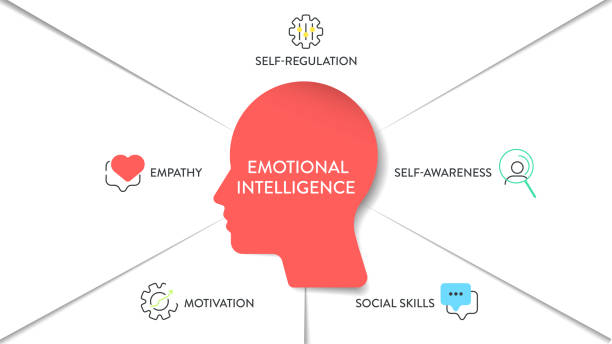Imagine this: You’re in a heated meeting where a colleague takes credit for your idea. Your face flushes, your pulse races, and you’re seconds away from snapping. But instead of lashing out, you take a breath, acknowledge their perspective, and calmly redirect the conversation. That’s emotional intelligence (EQ) in action. It’s not about suppressing emotions—it’s about navigating them skillfully to build stronger relationships, make better decisions, and thrive in chaos.
If you’ve ever felt hijacked by anger, paralyzed by self-doubt, or utterly lost in conflicts, you’re not alone. Most of us weren’t taught how to decode the messy world of feelings. But here’s the good news: Emotional intelligence isn’t fixed—it’s a skill you can cultivate. Whether you’re aiming to lead a team, mend a relationship, or simply feel more in control of your life, mastering EQ could be your greatest unlock. Let’s dive in.
What Is Emotional Intelligence? (And Why It’s Not Just “Being Nice”)
Emotional intelligence is your ability to recognize, understand, and manage your own emotions while empathizing with others’. Psychologist Daniel Goleman popularized the concept, breaking it into five core skills:
- Self-awareness: Tuning into your emotions as they arise.
- Self-regulation: Managing impulses and reactions.
- Motivation: Channeling emotions toward goals.
- Empathy: Sensing others’ unspoken feelings.
- Social skills: Building trust and resolving conflict.

Unlike IQ, EQ isn’t about raw brainpower—it’s about emotional agility. Think of it as your internal GPS for navigating office politics, family drama, or even your inner critic. Studies show that 90% of top performers have high EQ, and it’s twice as predictive of success as technical skills.
Why Emotional Intelligence Is Your Superpower in a Chaotic World
We’ve all met the “brilliant jerk”—the person with stellar credentials but zero people skills. They might climb the ladder temporarily, but they rarely sustain success. Here’s why EQ matters:
- Stronger relationships: EQ helps you listen deeply, diffuse tension, and build trust.
- Resilience: You bounce back faster from setbacks because you don’t get stuck in emotional spirals.
- Better decisions: Emotions data is just as critical as analytics. EQ lets you balance both.
Consider this: When SpaceX’s Starship exploded during a test launch, Elon Musk tweeted, “Congrats team!” He acknowledged the failure while focusing on progress—a masterclass in emotional regulation and motivating others.
4 Actionable Steps to Boost Your EQ (Starting Today)
1. Become a Detective of Your Own Emotions
Self-awareness is the foundation. Start by:
- Labeling feelings precisely: Instead of “I’m stressed,” ask: Am I overwhelmed? Resentful? Afraid of failing?
- Tracking triggers: Use a mood journal to note when frustration spikes. Is it deadlines? Certain people?
- Practicing mindfulness: Spend 5 minutes daily observing your thoughts without judgment. Apps like Headspace or simple breathwork can help.
Pro tip: If you’re holding onto past hurts that cloud your reactions, explore our guide on letting go of the past to clear emotional clutter.
2. Pause Before You React (The 6-Second Rule)
When emotions flare, your brain’s amygdala (the “fight or flight” center) hijacks logic. To regain control:
- Breathe in for 4 seconds, hold for 2, exhale for 6. This resets your nervous system.
- Ask, “What’s the need beneath this emotion?” Anger often masks a need for respect; anxiety might signal a desire for safety.
- Choose your response: Instead of snapping, try: “I need a moment to process this. Let’s revisit in 10 minutes.”
3. Practice “Cognitive Empathy” in Tough Conversations
Empathy isn’t about agreeing—it’s about understanding. Next time someone upsets you:
- Paraphrase their stance: “It sounds like you’re frustrated because…”
- Validate their emotion: “I’d feel the same way in your position.”
- Ask open questions: “What would a fair solution look like to you?”
Real-world example: A manager at Google noticed her team was disengaged. Instead of reprimanding, she hosted one-on-ones to ask, “What’s making your job harder?” Turnover dropped 30%.
4. Turn Conflicts into Collaborations
High-EQ people don’t avoid conflict—they reframe it. Use the “Yes, and…” technique from improv:
- Acknowledge their point: “Yes, I see why the deadline worries you…”
- Add your perspective: “…and if we adjust the project scope, we can hit the target without burnout.”
When EQ Feels Hard: Navigating Common Roadblocks
- “I’m too sensitive!” Sensitivity is a strength—it means you notice nuances others miss. Pair it with self-regulation.
- “What if I get manipulated?” EQ includes boundaries. You can empathize with someone’s stress and say no to unreasonable demands.
- “I don’t have time for this.” Start small. Even one daily mindful conversation builds EQ muscles over time.
Your EQ Journey: Progress Over Perfection
Developing emotional intelligence isn’t about becoming a zen master—it’s about showing up authentically while respecting others. Celebrate tiny wins: Did you pause before reacting to a rude comment? Did you name your emotion accurately? That’s growth.
For more tools on self-awareness and resilience, explore Venzec.icu. Dive into guides on mindfulness, communication, and crafting a life that aligns with your values.
Remember: Every emotionally intelligent choice you make ripples outward. Whether you’re leading a team, parenting, or rebuilding trust in a relationship, EQ is the quiet force that turns friction into flow. Start today—your future self will thank you.










Leave a Reply